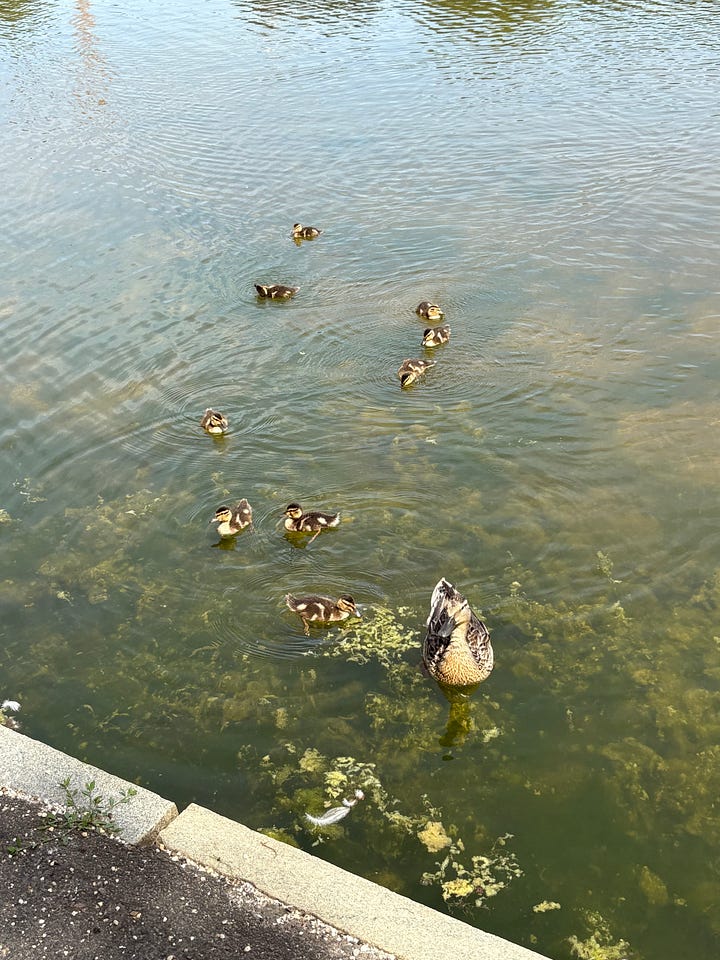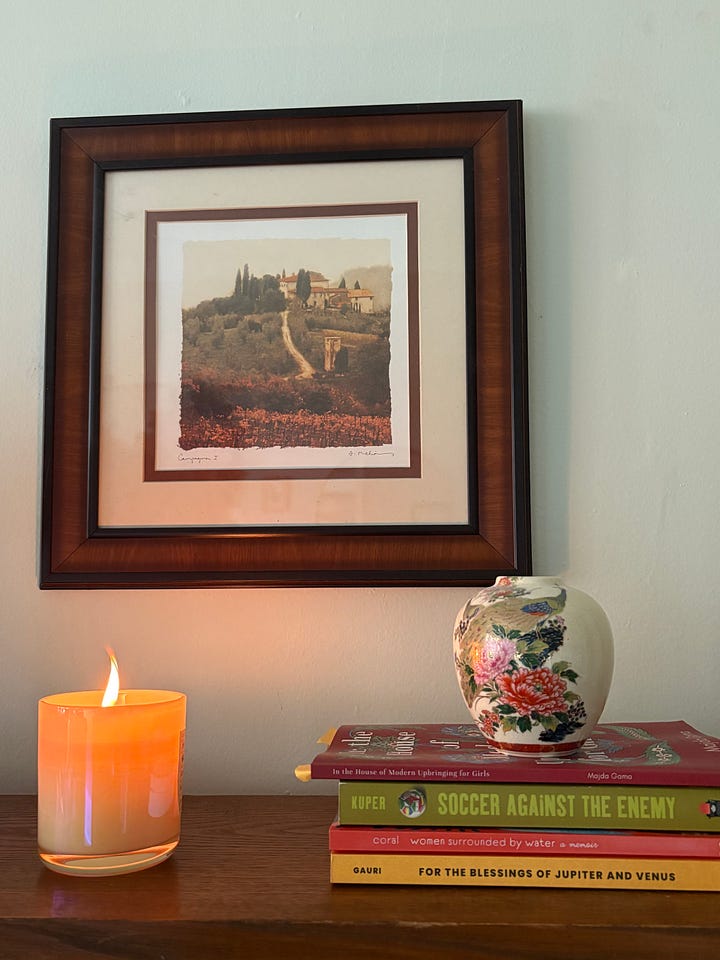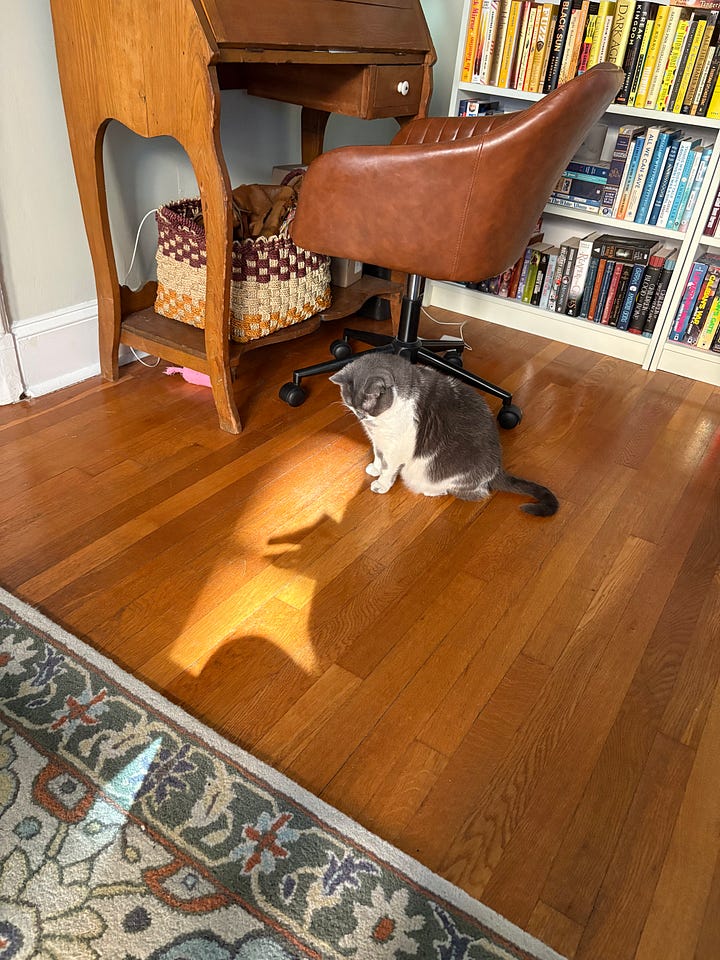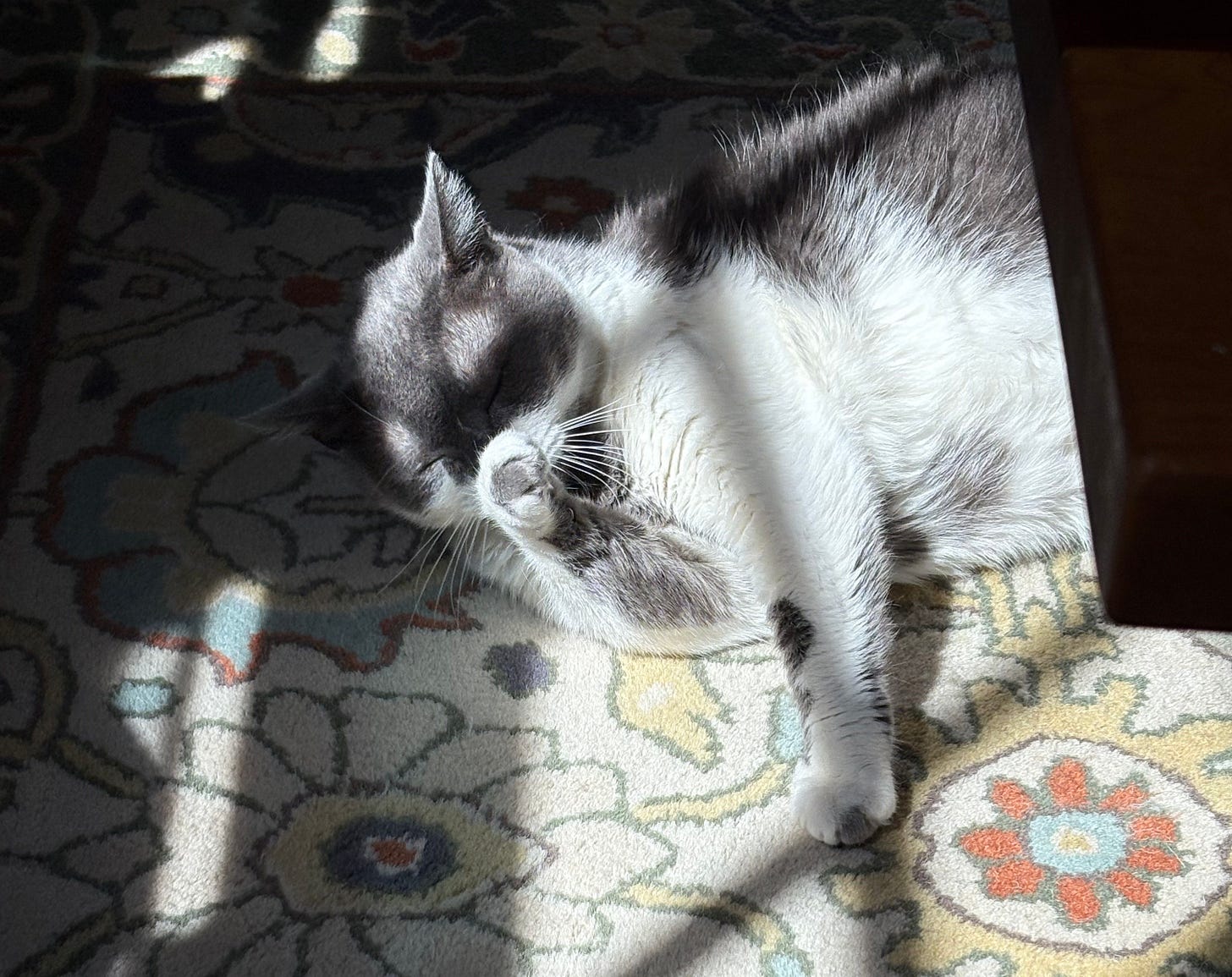Seeking Out the Sun Spots
Facing my own negativity, embracing earnestness, and cringing through all of it.
When I met up with a friend the other day, we hugged, said our hellos, and then asked each other how we’re doing. We looked at each other with matching expressions: furrowed brows, hesitant smiles. “Good?” I said. “And…bad?”
We commiserated about how difficult it is to put words to the present moment. There’s a lot of beauty in my life right now—work is good, friends are great, my nieces and nephews are amazing, my cat is purring while napping next to me, late spring in DC is gorgeous—but it’s all underlaid with the chaos of national and international issues. I don’t think I need to spell out what’s causing me stress, but to sum it up quickly: I don’t agree with just about anything our president is doing, our climate is screwed, genocide is occurring as I live and breathe, many friends are out of work based on some guy deciding our government is wasting money…I could go into deeper detail, but I feel that 1. we’re all aware, and 2. I simply don’t have the wherewithal to hash it out right now.
But this underlying stress at all times is not so foreign for me, or, I suspect, any of us. I have a tendency to look back at even my past with regret and disgust, constantly rethinking what I should have said or done in different situations. When I recount trips or other experiences to friends and family, I tend to focus on the dramatic parts—the parts that didn’t work out as planned, the parts where someone said or did something insane that subsequently causes memory rifts.
This tendency doesn’t come from nowhere, of course. As a writer, I’ve been trained to untangle the difficult, the weird, the inconceivable. Not many people want to read an essay that focuses on how happy I felt lying in the sun in Florida, reading Flight Behavior by Barbara Kingsolver. It’s more interesting to retell the strange interactions with locals while on that same trip, because others can relate to those moments on deeper, more inquisitive levels.
BUT, all that said, I do tend to cross the line, to wallow in the darkness, in the hopelessness, in the regret. It’s really easy to do that right now, while headlines from all sorts of news sources remind us what there is to wallow about. And as mentioned above, there is A LOT to wallow about. In my personal psyche, however, I’ve got to turn some things around.
I’m doing what I can to help local and international crises by donating money or time. I’m volunteering as a citizen scientist, tracking duck behavior in downtown DC. (It’s duckling season!) And I’m also volunteering on a local urban farm that helps provide food to lower-income residents in DC. I’m donating money to various causes to help with all the things I’ve been wallowing about. So, physically, I’m doing something.
But mentally?




I went to Moab, Utah, about a month ago with one of my best friends. It was an amazing trip. On the drive from my parent’s house near Salt Lake City, we left rocky mountains for red rocks and sage brush, playing music from movies that are not musicals but which have original music nonetheless. (That Thing You Do, Music and Lyrics, Begin Again, etc.) And we chatted about how we both feel a tendency to focus on the bad in our lives.
We made a pact then and there to focus on the beautiful instead. And I know how cheesy this sounds, and I’m already cringing at myself—because as I’ve spelled out, this is new for me. But I’ve been trying.
Part of this effort comes from another conversation I had with my husband, about how his Gen-Z (and maybe even Gen Alpha?) students cringe hard at anything even remotely earnest. Maybe I’m more like them than I originally thought. It’s embarrassing and weird to reflect on all the good, to say out loud what we love and who we love and how we love. But that very earnestness and the vulnerability that comes with it feels like a necessary addition to the human existence. And I often purposefully, or inadvertently, avoid it.
A couple weeks ago, I was working from home, feeling a little depressed due to being alone all day. I had a work event in the evening, so I knew I’d see friends then, but I still had hours before I’d head out. Instead of focusing on the positive, I started picturing another life, some alternate reality where I live in a small town where everyone loves each other and agrees about everything and we have parties in a barn with twinkle lights and we dance the way people used to gather to dance. I longed for this completely made-up thing the same way I long for U.S. leaders to wake up and reverse every terrible thing they’ve done so far.
And then! Feeling depressed and down, I went to my work event. About halfway through, I looked around and realized that what I wanted was right in front of me: we were on the back patio of a restaurant and its wooden walls mimicked a barn, and there were twinkle lights strewn about. Friends and community were gathered around me, laughing and talking and dare I say, agreeing on things. No dancing, but we’ll get there. I was embarrassed that the cliché I hear all the time was applicable: what I wanted was right in front of me.
I’m embarrassed to say another cliché worked on me, too: all we have is now. Sometimes, I think I must have an event or an occasion to say, light a candle. But what if I could make any night magical?
I don’t know what I’ve been waiting for. It’s weird how long it takes for my brain to catch up to my body. I wanted to get into animal conservation, so I volunteered to count ducks and I go do it every other Sunday. I wanted to get my hands dirty, to not sit and stare at a screen all day, so I volunteered at the farm and I go do it every Wednesday morning. But even in those moments, I can often find myself thinking about how hot/cold I am, how these opportunities feel like such a small way to give back in the grand scheme of things. I have to actively pause, look around, and soak in the moments for what they are. I’m doing what I wanted! And it’s beautiful!
I don’t mean to sound like a self-help author here. I’m not trying to give advice, per se. I guess I’ve just been searching for some light in this pitch-black dark time, and I’m realizing just how much I’ve been spoiled with it. There’s always a caveat—at least in my brain—about how privileged that sounds, about not deserving it, about all the other people in the world who can’t say the same thing, or can in much lesser circumstances. I guess that’s why I used the word spoiled.
The pain, the regret, the anger, the sadness is never really gone—it’s always beating inside of me. I’m always ready to talk about it, even though no conversation feels long enough to convey the horror and terror I feel at the present moment. The daydreams about alternate realities help me cope. Leslie Jamison writes about daydreaming in her essay, “Dreamers in Broad Daylight: Ten Conversations,” and posits near the end that daydreaming “is about escape and alternatives” and “envisioning an outside to your life.” And while I daydream plenty of escapes and outsides—searching for houses in Alaska on Zillow, for instance—I’m trying to call those daydreams back home, to give into the beauty I have control over. If I’m dreaming about a candlelit cozy night at home, I can strike the match. I can watch the flame in wonder. I can forget for just a bit.





